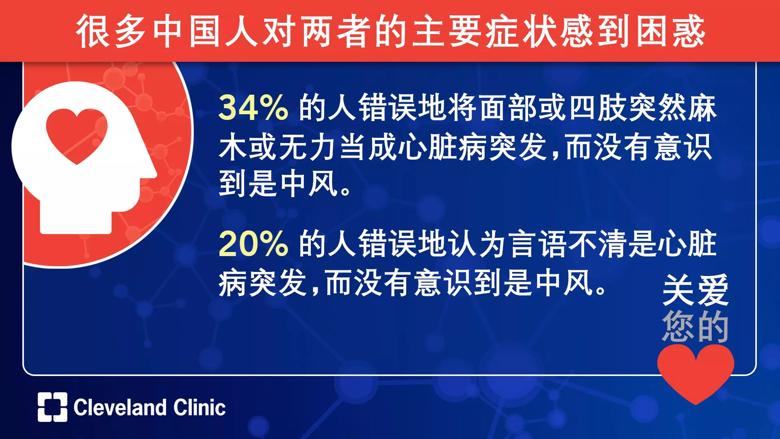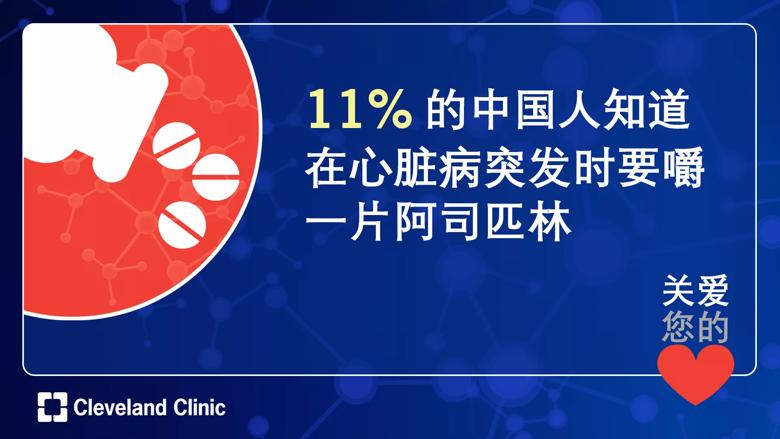Survey by Leading U.S. Hospital Cleveland Clinic Shows Need for Greater Heart Attack Awareness Among Chinese Public
Cleveland Clinic News Service | 216.444.0141
We’re available to shoot custom interviews & b-roll for media outlets upon request.
CCNS health and medical content is consumer-friendly, professional broadcast quality (available in HD), and available to media outlets each day.

Leading heart physicians at U.S.-based Cleveland Clinic say there is a need for greater heart attack awareness in China, after a survey found almost one-third of Chinese could not recognize signs of a heart attack, and more than half did not know what to do when experiencing symptoms of a heart attack.
Heart disease is the No. 1 cause of death around the world. The survey was conducted as part of Cleveland Clinic’s “Love your Heart” consumer education campaign. Cleveland Clinic has been ranked America’s No. 1 hospital for cardiology and cardiac surgery for 23 years in a row by US News & World Report.
While most (about 70 percent) of people could identify “pressure, squeezing, fullness or pain in the center of your chest” and 50 percent identified shortness of breath as heart attack symptoms, there is still confusion of symptoms when compared to a stroke. Thirty-four percent wrongly identified “sudden numbness or weakness of face, arm or leg” as a sign of a heart attack, while 20 percent wrongly identified “slurred speech” and 18 percent wrongly identified “sudden trouble seeing in one or both eyes” as heart attack symptoms.
“Heart attack/disease is the most common cause of death in the world. The most common symptom is sudden chest pain, and also pressure on the chest, and also there will be some type of symptom that is not so common,” said Michael Zhen-Yu Tong, M.D., a Cleveland Clinic cardiothoracic surgeon. “The not-so-common symptoms that some patients sometimes experience are pain down either or both arms, pain in the jaw, and some patients also feel nauseated in the stomach or experience abdominal pain. In the extreme case the patient might even lose consciousness.”
When it comes to their own heart emergencies, Chinese need additional education in identifying and responding to a heart attack. The survey found when asking what was the “thing to do first” in the event of a possible heart attack, less than half were able to identify one of two correct responses.
Only thirty-six percent correctly identified “call an ambulance” – widely considered by doctors as the fastest way for a patient to start receiving proper care – while only 11 percent said they would chew an aspirin as a first response. The common headache tablet is known to slow blood clotting and reduce the severity of a heart attack until help arrives, and chewing rather than swallowing the tablet whole helps the body absorb it faster.
However, 11 percent said they would call their physician, and another 11 percent said they would drive to the hospital – either driving themselves, or have someone else drive. Doctors say both courses of action are likely to delay treatment and place the patient at greater risk of serious heart damage, or death. Finally, six percent said they would rest and drink cold water.
“If someone feels they have a heart attack/ heart disease, they need to call 1-2-0 for emergency in China. Don’t drive yourself to the hospital and don’t ask your family to drive you,” said Dr. Tong. “If you have aspirin, you can chew one, or if you have nitroglycerin you can take that as well.”
Patients travel to Cleveland Clinic, located in Cleveland, Ohio, from around 185 countries every year for treatment, including locations in Weston, Fla.; Las Vegas, Nev.; Toronto, Canada; Abu Dhabi, UAE; and London, England to open in late 2020.
An interview with Dr. Michael Zhen-Yu Tong can be viewed below. Click HERE to download.
Video content: This video is available to watch online.
View video online (https://www.youtube.com/embed/NS03zEy0m0Y?feature=oembed&wmode=transparent)
Methodology: Cleveland Clinic’s survey of the general population to gathered insights into perceptions of heart disease. This was a online survey conducted among a nationally representative sample across 30 provinces in China, consisting of 1,012 adults, fifty-six percent male and forty-four percent female 18 years of age and older. We have weighted the numbers to be nationally representative. This online survey was conducted by YouGov between January 3 and 10, 2018.

Image content: This image is available to view online.
View image online (https://assets.clevelandclinic.org/transform/208992e0-a71a-4912-9313-cc065c9bc1aa/heart-china-graphic1_jpg)

Image content: This image is available to view online.
View image online (https://assets.clevelandclinic.org/transform/74708aa6-8442-4070-acc9-fbd932de3494/heart-china-graphic-2_png)
Cleveland Clinic is a nonprofit multispecialty academic medical center that integrates clinical and hospital care with research and education. Located in Cleveland, Ohio, it was founded in 1921 by four renowned physicians with a vision of providing outstanding patient care based upon the principles of cooperation, compassion and innovation. Cleveland Clinic has pioneered many medical breakthroughs, including coronary artery bypass surgery and the first face transplant in the United States. Cleveland Clinic is consistently recognized in the U.S. and throughout the world for its expertise and care. Among Cleveland Clinic’s 82,600 employees worldwide are more than 5,786 salaried physicians and researchers, and 20,700 registered nurses and advanced practice providers, representing 140 medical specialties and subspecialties. Cleveland Clinic is a 6,728-bed health system that includes a 173-acre main campus near downtown Cleveland, 23 hospitals, 280 outpatient facilities, including locations in northeast Ohio; Florida; Las Vegas, Nevada; Toronto, Canada; Abu Dhabi, UAE; and London, England. In 2024, there were 15.7 million outpatient encounters, 333,000 hospital admissions and observations, and 320,000 surgeries and procedures throughout Cleveland Clinic’s health system. Patients came for treatment from every state and 112 countries. Visit us at clevelandclinic.org. Follow us at x.com/CleClinicNews. News and resources are available at newsroom.clevelandclinic.org.
Editor’s Note: Cleveland Clinic News Service is available to provide broadcast-quality interviews and B-roll upon request.